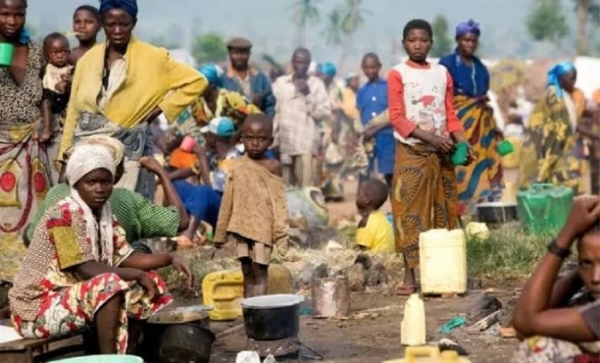The Nigerian economy has entered a period of severe hardship, marked by rapidly increasing poverty and hunger. This is driven by a complex combination of domestic economic challenges, policy choices, and external factors. The country's transition into deeper multidimensional poverty—where 133 million Nigerians were classified as such by the National Bureau of Statistics (NBS) in 2022—has been further compounded by the Bola Tinubu administration's policies, which have exacerbated inflationary pressures and eroded purchasing power. A combination of economic mismanagement, external shocks, and poor governance has resulted in significant devaluation of the Naira, skyrocketing fuel prices, and surging inflation, all of which continue to push more Nigerians into the poverty trap.
Naira Devaluation and Its Effects on Poverty
One of the most severe blows to the Nigerian economy has been the rapid depreciation of the Naira. Since President Bola Tinubu took office in May 2023, the Naira has fallen from N465/$ to N1,700/$ in the parallel market—a more than 70% loss in value . This drastic depreciation has not only diminished the purchasing power of Nigerians but also led to inflationary pressures that have particularly hurt the poor.
The reasons for the Naira's decline are multi-faceted. Nigeria remains heavily dependent on oil exports for foreign exchange, yet oil production has been severely constrained due to widespread theft and declining output. Furthermore, Nigeria’s future oil earnings are increasingly tied up in debt obligations, reducing the inflow of foreign exchange needed to stabilize the currency. The government’s decision to float the Naira in hopes of attracting foreign investment backfired, as it created more volatility without bringing in the expected influx of foreign capital.
This loss of value has translated directly into higher import costs, especially for essential goods like food and fuel, both of which are highly dependent on imports. The manufacturing sector has been hit hard, as many industries rely on imported raw materials. This has led to higher production costs and a subsequent rise in the prices of manufactured goods. As manufacturers struggle to stay afloat due to the scarcity of foreign exchange and rising energy costs, many have been forced to reduce operations, leading to layoffs and further weakening consumer demand.
Rising Fuel Prices and the Energy Crisis
The removal of fuel subsidies, which saw petrol prices soar from N187/litre to N1,000/litre, has been another key factor driving poverty and social unrest. With petrol being a critical input not just for transportation but also for electricity generation—due to Nigeria’s unreliable power grid—the increase in fuel prices has had a cascading effect across the economy. Transportation costs have surged, driving up the price of food and other essential goods, and businesses, particularly small enterprises, have struggled to cope with the added operational costs.
The government’s decision to end fuel subsidies aligned with IMF and World Bank policies aimed at market liberalization, but the timing and execution have worsened living conditions for the average Nigerian. The policy change was intended to free up government revenues for more productive uses, but in the absence of a social safety net, the poor have borne the brunt of the cost increases. Furthermore, the expectation that the Dangote Refinery would lower fuel costs has been met with delays and uncertainties. Even when operational, the refinery’s ability to stabilize fuel prices is constrained by broader issues like exchange rate volatility and global oil market dynamics.
Inflation and Food Insecurity
Nigeria's inflation has risen sharply from 22.4% when Tinubu took office to 32.15% by August 2024. The country is caught in a vicious cycle of rising costs, reduced economic activity, and declining consumer demand. High inflation has been driven by several key factors:
1. Monetary policy and high interest rates: The Central Bank of Nigeria (CBN) has raised the Monetary Policy Rate (MPR) to 27.25% in a bid to control inflation, but this has only made borrowing more expensive for businesses, particularly manufacturers. The resulting slowdown in production has led to supply shortages, which in turn have driven up prices.
2. Agricultural disruptions and food inflation: Food inflation has been particularly damaging, especially for the poor, who spend a significant portion of their income on food. Nigeria’s agricultural sector has been hit by insecurity, particularly in the northern regions, where insurgency and banditry have disrupted farming activities. This has led to reduced output and higher food prices, with no immediate solution in sight. Additionally, Nigeria loses up to 50% of its agricultural produce post-harvest due to poor infrastructure and storage facilities, exacerbating food shortages.
3. Currency depreciation: As the Naira has continued to fall, the cost of imported food and agricultural inputs has risen, putting further pressure on food prices. Smuggling of essential goods like food across Nigeria’s porous borders into neighboring countries has also contributed to domestic shortages and price hikes.
The Outlook: No Relief in Sight
Given the current trajectory of the Nigerian economy, there is little hope that poverty and hunger will abate any time soon. Several structural challenges will continue to prevent any meaningful economic recovery in the short or medium term:
- Dependence on imports and a weak manufacturing base: As long as Nigeria remains dependent on imported goods, including fuel and food, the country will continue to be vulnerable to global price fluctuations and exchange rate volatility. The lack of a robust manufacturing sector limits the ability of the economy to generate foreign exchange, exacerbating the currency crisis and perpetuating poverty.
- Foreign exchange shortages: The scarcity of foreign exchange will continue to drive up the cost of imports and fuel inflation. The government’s limited ability to intervene in the currency market means that the Naira is unlikely to stabilize without substantial foreign investment or an increase in oil production, both of which seem unlikely in the near term.

